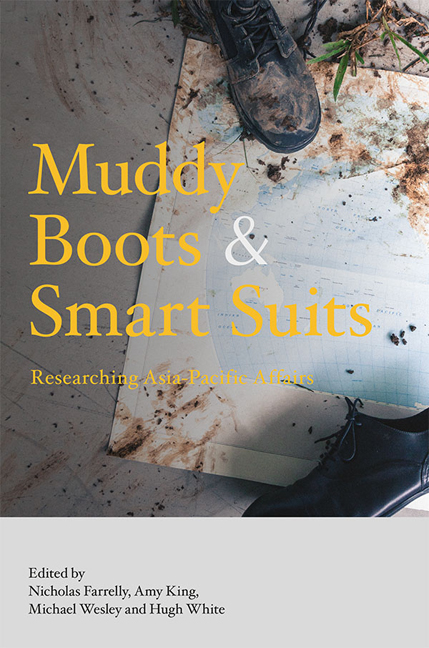Book contents
- Frontmatter
- Contents
- About the Contributors
- 1 Introduction to Research in Asia-Pacific Affairs
- Section I In the Field
- 2 Studying Policy from the Ground Up: The Solomon Islands Case
- 3 Reflections on Political Cultures in Thought and Action
- 4 Human Considerations in Conflicted Societies
- Section II Analysing Politics
- Section III Shaping a Region
- Section IV Conflict and Order
- Section V Policy and Practice
- Bibliography
- Index
4 - Human Considerations in Conflicted Societies
from Section I - In the Field
Published online by Cambridge University Press: 12 January 2018
- Frontmatter
- Contents
- About the Contributors
- 1 Introduction to Research in Asia-Pacific Affairs
- Section I In the Field
- 2 Studying Policy from the Ground Up: The Solomon Islands Case
- 3 Reflections on Political Cultures in Thought and Action
- 4 Human Considerations in Conflicted Societies
- Section II Analysing Politics
- Section III Shaping a Region
- Section IV Conflict and Order
- Section V Policy and Practice
- Bibliography
- Index
Summary
INTRODUCTION
War is a complex and deeply social process that reaches lives far beyond soldiers on the battlefield. The first department of international relations was founded in Aberystwyth in 1919 following the horrors of the First World War, and as a discipline, it has always been captivated by the central problem of preventing the devastation of war on human populations, even if scholars disagree on how this can be achieved. Although war is an enduring feature of global politics, the character of war itself has changed significantly over the past century (Strachan and Scheipers 2011). We are fortunate not to have experienced another major world war despite the creation of 142 new nation states since 1945, yet war itself has become much more fragmented and internalized within this period. The rapid changes in the mode and characteristics of today's conflicts challenge the way that scholars consider their methodological approaches to studying the impact of armed conflict on societies.
This chapter focuses on methodological considerations for researching populations impacted by armed conflict in the Asia-Pacific, a region that experienced major conflicts in the Cold War period, has the potential for major interstate conflicts, and continues to be confronted by a range of diverse internal conflicts that threaten the security of domestic populations. The starting point for thinking about methodological approaches here is to consider the nature of the field that is being researched — what are the historical, social, and political characteristics of the conflict settings? How are conflict-affected populations situated within this overarching field? What are the implications of the way that the field is conceptualized for advocating for the agency, protection, and human rights of the affected populations?
This chapter is therefore concerned with two sets of developments in international politics and academic practice that are important for considering approaches to research on the humanitarian impact of armed conflict. The first set of developments is in global politics where we find, on the one hand, the strengthening of international norms and rules to regulate armed conflict that are increasingly geared towards the protection of individuals in war. On the other hand, the fragmentation and internalization of armed violence within the state creates ambiguity in the international legal and regulatory space, and challenges international efforts to protect populations affected by conflict.
- Type
- Chapter
- Information
- Muddy Boots and Smart SuitsResearching Asia-Pacific Affairs, pp. 40 - 56Publisher: ISEAS–Yusof Ishak InstitutePrint publication year: 2017



